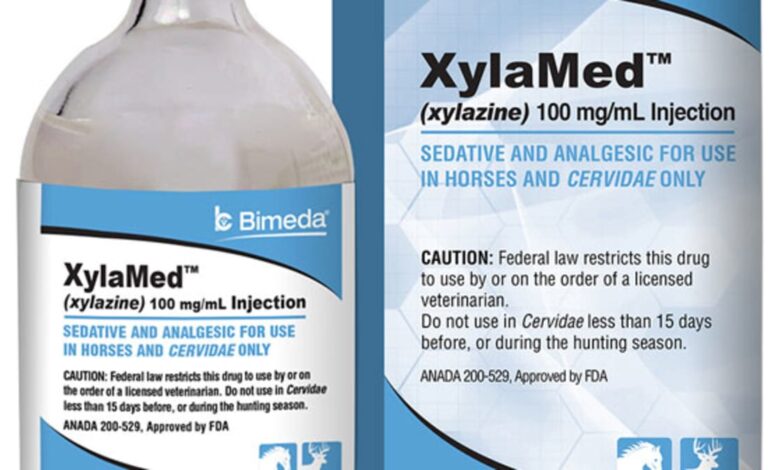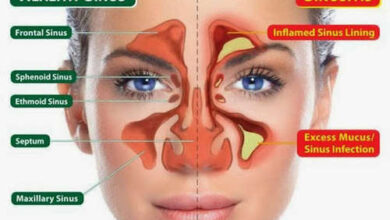What Does Xylazine Do to Humans?

Xylazine is an alpha‐2‐adrenergic agonist which works by decreasing the release of norepinephrine and dopamine which can result in pain relief, sedation, and muscle relaxation. It is used as a veterinary medication for sedation, analgesia and muscle relaxation in animals such as horses, cattle and other non-human mammals. Veterinarians also use xylazine as an emetic, especially in cats.
Xylazine was discovered as an antihypertensive agent in 1962 by Farbenfabriken Bayer in Leverkusen, Germany. It is important to note that, xylazine is not approved for use in humans, there is not robust enough research in this arena to fully understand its potential impacts on humans.
Is xylazine a controlled substance?
Xylazine is not a controlled substance; it is marketed as a veterinary drug and used as a sedative, analgesic and muscle relaxant. Although xylazine is not a Drug Enforcement Administration-scheduled drug, FDA grants approval for veterinary use.
Why is xylazine abused?
Most people abuse this drug because of the relaxation and “high” it provides. Xylazine is thought to affect neurotransmitters like serotonin and dopamine, in addition to acetylcholine which is only found in animals. Serotonin plays a key role in impulse regulation, which plays an important part in the development and maintenance of an addiction. The neurotransmitter has a complex impact on most illicit and legal substances.
Experts are still studying exactly how dopamine, a neurotransmitter, works in the context of addiction. Many believe it trains your brain to avoid unpleasant experiences and seek out pleasurable ones. It’s this role in reinforcing your brain’s quest for pleasure that’s led many to associate dopamine with addiction.
What does xylazine do to humans?
Xylazine is not approved for use in humans. When used by humans, it could cause central nervous system depression, respiratory depression, bradycardia, hypotension, and even death. Its chronic use is reported to be associated with physical deterioration and skin ulceration. Xylazine alone has proven harmful to humans and even more when it is combined with drugs of abuse.
One major concern when it comes to xylazine abuse is fentanyl. The Philadelphia Medical Examiner’s Office detected xylazine in seven drug-related deaths wherein fentanyl also yielded a positive test. The connection is thought to be due to the practice of adulterating or “cutting” street drugs like heroin and cocaine with less expensive, lower quality, more dangerous substances like fentanyl, and now xylazine. This increases the seller’s profit margin but has proven to be fatal for the individuals who, knowingly or unknowingly, used the adulterated drugs.
How to Overcome Xylazine Abuse and Addiction
Developing an addiction to drugs like xylazine isn’t a character flaw or a sign of weakness, and it takes more than willpower to overcome the problem. Abusing xylazine can create changes in the brain, causing powerful cravings and a compulsion to use that makes sobriety seem like an impossible goal. But recovery is never out of reach, no matter how hopeless your situation seems or how many times you’ve tried and failed before. With the right treatment and support, change is always possible.
For many people struggling with xylazine addiction, the toughest step toward recovery is the very first one: recognizing that you have a problem and deciding to make a change. It’s normal to feel uncertain about whether you’re ready to start recovery, or if you have what it takes to quit. If you’re addicted to xylazine, you may be concerned about how you’re going to find an alternate way to treat a medical condition. It’s okay to feel torn. Committing to sobriety involves doing many things, including:
Surrounding yourself with supportive people. One of the most important things you can do to stay sober is to find friends who are sober, too. While it may be hard to cut off unhealthy relationships of your past, hanging out with people who support your need to stay clean will pay off in the long run.
Finding new hobbies. Staying busy is the best way to keep your mind off your desire to use. Not only that, but establishing an interesting and rewarding hobby can also help you find joy and purpose in your life, and replace your old unhealthy habits with new drug-free activities.
Exercise. Working out is good for the body and the mind. As your physical health improves, you’ll also experience the “natural high” of endorphins, which can elevate your mood. And an exercise routine creates a structure to your days, helping to reduce your risk of a relapse.
Volunteer. Finding a worthy cause to support while in recovery allows you to help others while helping yourself. Giving back to the community can help you discover a sense of purpose, build healthy connections and friendships, and feel good about the contributions you’re making to society.
Eat well. The food you eat has a serious impact on your wellbeing. By making sure you consume a healthy, well-rounded diet, you’ll keep yourself in shape – both physically and mentally. And if you’re feeling good, then you’re less likely to turn to drugs for a mood booster.
Talk it out. Sometimes, you need someone to talk to about what’s going on in your recovery. Sharing your thoughts with someone who understands your experiences and can help support you through the difficult times is invaluable. Find a local support group, work with a sponsor, or call up a trusted friend to talk to when the going gets tough.
Meditate. Mindfulness exercises have been proven to relieve stress and anxiety, as well as to decrease blood pressure and improve immune function. Developing a meditation practice can help you to find calm and peace, and quiet your mind in an otherwise turbulent time.
Seek professional help. Recovery from xylazine addiction is hard, and there’s no shame in asking for extra help from a medical professional when you need it. Physicians and behavioral therapists can set you up for success with structured programs, providing a safe way to prevent relapses and maintain sobriety.

